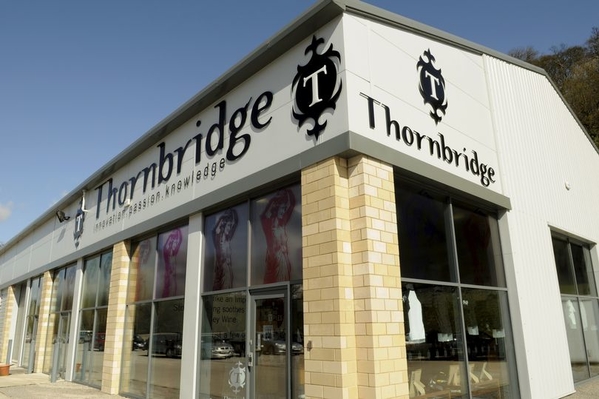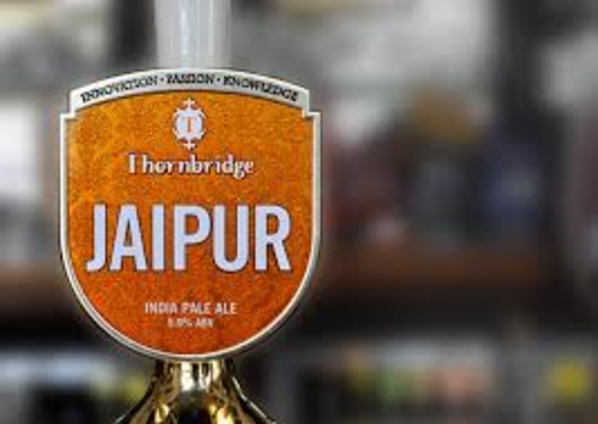Thornbridge sees off the pandemic
Added: Sunday, July 25th 2021

Thornbridge Brewery, hailed as one of the pioneers of the craft beer movement, started life as a tiny brewery in a garden shed but went on to become a sizeable one with a capacity of 25,000 barrels a year and an impressive portfolio of beers.
Along the way Thornbridge has won a vast number of awards for its beers and has turned its leading ale, Jaipur IPA, into an international brand that has helped drive the global pale ale revival.
The brewery was the brainchild of Jim Harrison (pictured) and Simon Webster. Jim made money from his company that supplied insulating materials to steel and other industries and he was able to buy the 12th-century Thornbridge Hall in the Derbyshire Dales. He moved in with his wife Emma and their children and set about restoring the hall -- which had become a teachers’ training college -- and its 12 acres of gardens.
“The place was a wreck,” he says. “We needed to commercialise it and one way was to make beer.”
Jim met Simon Webster through their shared support of Sheffield Wednesday football club. Simon worked on the marketing side of the food business and he and Jim launched a range of pickles and specialist coffees at Thornbridge. They added beer as a result of supplying pickles to the Fat Cat pub in Sheffield run by Dave Wickett, who also owned the Kelham Island Brewery. The brewery won the prestigious Champion Beer of Britain award in 2004 for Pale Rider, one of the early examples of hoppy golden ale.
Even though Dave supported Sheffield United – and such things matter in Steel City -- Jim loved Pale Rider and discussed setting up a brewery at the hall with Dave’s support. They sourced a 10-barrel plant from a closed brewery near York and installed the kit in 2004 in a former stonemason’s and joiner’s shop in the grounds. It took a year to re-design the building and squeeze in the kit and finally the first beer was launched in 2005.
They hired two mustard-keen young brewers, Stefano Cossi and Martin Dickie. Thornbridge proved a good training ground as Stefano later joined Molson Coors and Martin went on to become one of the founders of BrewDog in Scotland. A third brewer, Kelly Ryan, became a major force in the beer revolution Down Under when he returned to his native New Zealand.

The first Thornbridge beer was a traditional bitter called Lord Marples after the 19th-century owner of the hall. It was followed by Blackthorn, which could have caused problems as there’s a leading cider with that name.
“We didn’t get a lawyer’s letter!” Jim laughs. “The beer was named after a motif in a stained-glass window in the hall designed by William Morris and Edward Burne-Jones.” Morris and Burne-Jones were leading members of the Arts & Crafts Movement in the 19th century.
The breakthrough came on 7 June 2005 with the launch of Jaipur IPA. It was named after the city where Jim and Emma got married but the beer also stressed the links to the early pale ales brewed in England for the Raj in India.
“Jaipur was influenced by American IPAs,” Simon Webster says, “but we’re a nation of pint drinkers and we needed a cask beer with drinkability. IPA is an English style that went to the U.S. and then came back again.”
Jim adds: “Dave Wickett said we needed a beer that would turn people’s heads. He took one sip of Jaipur and said: ‘That’s a world beater’.”
The 5.9 per cent beer, originally in cask and bottle but now also in keg and can, lived up to Dave’s prediction. It accounts for 40 per cent of the brewery’s output and is exported to more than 30 countries. It’s brewed with Maris Otter, the finest English malting barley and – stressing the American influence – is hopped with Ahtanum, Cascade, Centennial, Chinook, Columbus and Simcoe varieties.
It’s won more than 100 awards in competitions around the world and Simon recalls it winning two awards in one week from beer festivals as far apart as Aberdeen and Penzance.
He’s careful not to claim that Thornbridge was the pioneer of craft brewing. “We either started the wave or caught it,” he says. “Our aim was a simple one: to bring people to better beer.”

And better beer includes cask ale. Before the coronavirus crisis, Thornbridge had planned 12 new cask ales for 2020 and the brewery, Simon says, was selling more cask than at any time in its history.
“It’s part of our heritage,” he says, “but we’ve brought modernity to the sector with the likes of Ice-cream Porter and Flat White Pale Ale.”
The demand for Thornbridge beer rapidly outpaced the original plant. In 2009 a new site, the Riverside, was built in Bakewell alongside the River Wye close to where Richard Arkwright, called the Father of the Industrial Revolution, harnessed the power of the water to build his cotton spinning frames.
Thanks to his Italian connections, Stefano Cossi recommended that Jim and Simon should commission a plant from Velo, which designed kit capable of producing both ale and lager.
Head brewer Rob Lovatt says he can push four brews a day through the plant. His lagers, such as Lukas, enjoy a cold fermentation at 9 degrees C and are stored for a minimum of four to five weeks. He uses malt from the German town of Bamberg, world-acclaimed for the quality of its brewing grains, and his yeast culture also comes from Bavaria.
Rob joined Thornbridge in 2010 from Meantime in London and he uses that experience to fashion a wide range of beers. He plans more bottle-conditioned ales and says his draught beers are “properly cask conditioned”: he’s critical of some brewers who cut corners where cask ale is concerned.
He plans a number of collaboration beers with other brewers, starting with Salopian: Harvey’s and Timothy Taylor will follow when the current crisis is over.
The most innovative “collab” was a beer called Serpent, brewed with Garrett Oliver, the renowned brewmaster at the Brooklyn Brewery in New York City. The 10 per cent Belgian-style golden ale beer was aged in Bourbon casks for 18 months and it had an addition of lees, the sediment in a cider cask that’s packed with protein and wild yeasts. It was supplied by Tom Oliver, the acclaimed cider maker in Herefordshire, and the lees created a secondary fermentation before the beer was filled into Champagne bottles and released in 2016.
Brewing continues at the original plant at Thornbridge Hall, where small batch and experimental beers are made. Rob and his team are keen on barrel-ageing and have experimented with several different versions of St Petersburg Russian Imperial Stout (7.4 per cent) using whisky, bourbon, wine and sherry barrels.
In common with Jaipur, St Petersburg has picked up many awards and Simon Webster says the team were especially pleased when, against stiff competition, it was named CAMRA’s Champion Winter Beer of Britain in December 2019.
In that year, Thornbridge produced an impressive 85 beers and new cask and keg beers were planned for 2020 before the coronavirus epidemic meant all the plans had to be shelved and rewritten.
Dominic Metcalfe, the brewery’s sales and marketing director, says they’re well placed to weather the storm, with half of production available in bottle and can, along with six litre mini kegs.
Dom has an impressive track record of eight years with Adnams, a year with Tim Taylor and also a spell with Black Isle in Scotland. He’s convinced cask beer will bounce back when the epidemic ends and Jaipur will continue its double-digit growth. He export to 35 countries and sells cask beer in such unlikely markets as France and Italy.
“France is our second biggest export market,” he says. “Finland is the biggest market and cask has cult status there. Denmark is also big for cask.”
Thornbridge owns six pubs in Sheffield and a further two food-led outlets. Jim Harrison personally owns the Pack Horse in Little Longstone near his home. The brewery runs three brew pubs in collaboration with Pivovar – the name is Czech for brewery – in York, Leeds and Birmingham. The partnership is with the Czech brewer Bernard. While Thornbridge doesn’t own the brilliantly restored Sheffield railway station tap, its beers are on prominent sale there and many travellers, including this writer, have been known to miss a train or three while supping in the opulent Victorian bar.
Whether or not Thornbridge started the craft beer wave, it’s certainly on the crest of that wave now, with its large range of beers available at home and abroad. The only sadness has been the death in 2012 of Dave Wickett. Dave inspired Jim and Simon and remained a consultant until he lost a brave struggle with cancer.
Jim Harrison has picked up the flame lit by Dave in Sheffield with the Fat Cat and Kelham Island. “Cask ale is quintessentially about British beer and pubs,” he says. “It’s the best way to drink.”
And long may it remain so.
First published in BEER magazine, autumn 2021. Photos of the brewery and Jim Harrison courtesy Derby Evening Telegraph








